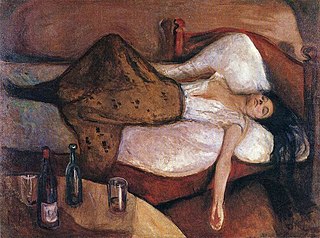Related Research Articles

Alcohol intoxication, also known in overdose as alcohol poisoning, commonly described as drunkenness or inebriation, is the behavior and physical effects caused by a recent consumption of alcohol. In addition to the toxicity of ethanol, the main psychoactive component of alcoholic beverages, other physiological symptoms may arise from the activity of acetaldehyde, a metabolite of alcohol. These effects may not arise until hours after ingestion and may contribute to the condition colloquially known as a hangover. The term intoxication is commonly used when large amount of alcohol is consumed along with physical symptoms and deleterious health effects.

Low-alcohol beer is beer with little or no alcohol by volume that aims to reproduce the taste of beer while eliminating or reducing the inebriating effect, carbohydrates, and calories of regular alcoholic brews. Low-alcohol beers can come in different beer styles such as lagers, stouts, and ales. Low-alcohol beer is also known as light beer, non-alcoholic beer, small beer, small ale, or near-beer.

Drinking culture is the set of traditions and social behaviors that surround the consumption of alcoholic beverages as a recreational drug and social lubricant. Although alcoholic beverages and social attitudes toward drinking vary around the world, nearly every civilization has independently discovered the processes of brewing beer, fermenting wine and distilling spirits.
"Hair of the dog", short for "hair of the dog that bit you", is a colloquial expression in the English language predominantly used to refer to alcohol that is consumed as a hangover remedy. Many other languages have their own phrase to describe the same concept. The idea may have some basis in science in the difference between ethanol and methanol metabolism.

A standard drink or unit of alcohol is a measure of alcohol consumption representing a fixed amount of pure alcohol. The notion is used in relation to recommendations about alcohol consumption and its relative risks to health. It helps to educate alcohol users. A hypothetical alcoholic beverage sized to one standard drink varies in volume depending on the alcohol concentration of the beverage, but it always contains the same amount of alcohol and therefore produces the same amount of drunkenness. Many government health guidelines specify low to high risk amounts in units of grams of pure alcohol per day, week, or single occasion. These government guidelines often illustrate these amounts as standard drinks of various beverages, with their serving sizes indicated. Although used for the same purpose, the definition of a standard drink varies from country to country.

Purposeful production of alcoholic drinks is common and often reflects cultural and religious peculiarities as much as geographical and sociological conditions.
Alcohol has a number of effects on health. Short-term effects of alcohol consumption include intoxication and dehydration. Long-term effects of alcohol include changes in the metabolism of the liver and brain, several types of cancer and alcohol use disorder. Alcohol intoxication affects the brain, causing slurred speech, clumsiness, and delayed reflexes. Alcohol consumption can cause hypoglycemia in diabetics on certain medications, such as insulin or sulfonylurea, by blocking gluconeogenesis. There is an increased risk of developing an alcohol use disorder for teenagers while their brain is still developing. Adolescents who drink have a higher probability of injury including death.

The health effects of wine are mainly determined by its active ingredient – alcohol. Preliminary studies found that drinking small quantities of wine, particularly of red wine, may be associated with a decreased risk of cardiovascular diseases, cognitive decline, stroke, diabetes mellitus, metabolic syndrome, and early death. Other studies found no such effects.
Alcohol measurements are units of measurement for determining amounts of beverage alcohol.
Alcohol is any organic compound in which a hydroxyl functional group (-OH) is bound to a carbon atom, usually connected to other carbon or hydrogen atoms. An important class are the simple acyclic alcohols, the general formula for which is CnH2n+1OH. Of those, ethanol (C2H5OH) is the type of alcohol found in alcoholic beverages, and in common speech the word alcohol refers specifically to ethanol. Articles related to alcohol include:

Delirium tremens is a rapid onset of confusion usually caused by withdrawal from alcohol. When it occurs, it is often three days into the withdrawal symptoms and lasts for two to three days. Physical effects may include shaking, shivering, irregular heart rate, and sweating. People may also hallucinate. Occasionally, a very high body temperature or seizures may result in death. Alcohol is one of the more dangerous drugs to withdraw from.

A hangover is the experience of various unpleasant physiological and psychological effects usually following the consumption of alcohol, such as wine, beer, and liquor. Hangovers can last for several hours or for more than 24 hours. Typical symptoms of a hangover may include headache, drowsiness, concentration problems, dry mouth, dizziness, fatigue, gastrointestinal distress, absence of hunger, light sensitivity, depression, sweating, hyper-excitability, irritability, and anxiety.

A nightcap is a drink taken shortly before bedtime. For example, a small alcoholic drink or glass of warm milk can supposedly promote a good night's sleep.

An alcoholic beverage is a drink that contains ethanol, a type of alcohol and is produced by fermentation of grains, fruits, or other sources of sugar. The consumption of alcoholic drinks, often referred to as "drinking", plays an important social role in many cultures. Alcoholic drinks are typically divided into three classes—beers, wines, and spirits—and typically their alcohol content is between 3% and 50%.
The spins is an adverse reaction of intoxication that causes a state of vertigo and nausea, causing one to feel as if "spinning out of control", especially when lying down. It is most commonly associated with drunkenness or mixing alcohol with other psychoactive drugs such as cannabis. This state is likely to cause vomiting, but having "the spins" is not life-threatening unless pulmonary aspiration occurs.
In the alcoholic beverages industry, congeners are substances, other than the desired type of alcohol, ethanol, produced during fermentation. These substances include small amounts of chemicals such as methanol and other alcohols, acetone, acetaldehyde, esters, tannins, and aldehydes. Congeners are responsible for most of the taste and aroma of distilled alcoholic beverages, and contribute to the taste of non-distilled drinks. Brandy, rum and red wine have the highest amount of congeners, while vodka and beer have the least.

Neknominate, also known as neck and nominate, neknomination or neck nomination, is an online drinking game. The original rules of the game require the participants to film themselves drinking a pint of an alcoholic beverage, usually beer, in one gulp and upload the footage to the web. A participant then nominates another person to do the same within 24 hours.

Alcohol, sometimes referred to by the chemical name ethanol, is a depressant drug that is the active ingredient in fermented drinks such as beer, wine, and distilled spirits. Technically, alcoholic beverages contain several types of psychoactive alcohols. The most prevalent alcohol is the primary alcohol ethanol. Ethanol has toxic and unpleasant actions in the body, many of which are mediated by its byproduct acetaldehyde. Less prevalent alcohols found in alcoholic beverages, but that are less toxic than primary alcohols, are secondary, and tertiary alcohols. Tertiary alcohols are least toxic, since they cannot be oxidized into aldehyde or carboxylic acid metabolites. For example, 2M2B is 20 times more potent than ethanol. Some tertiary alcohols, like 2M2B have been synthesized and used recreationally. Alcoholic beverages are sometimes laced with toxic alcohols, such as methanol and isopropyl alcohol. A mild, brief exposure to isopropyl alcohol is unlikely to cause any serious harm, but many methanol poisoning incidents have occured through history, since methanol is lethal even in small quantities, as little as 10–15 milliliters.
A Royal Hangover is a 2014 documentary film written and directed by Arthur Cauty and co-produced by Silver Levy-So that explores alcoholism in Britain, examining why the country faces such severe problems relating to alcohol and the taboo issues relating to it.

Alcohol in the United Kingdom is legal to buy, sell and consume. Consumption rates within the country are high among the average of OECD nations however average among European countries but consistently ranks highest on binge drinking culture. An estimated 29 million people in the United Kingdom drank alcohol in 2017.
References
- ↑ "The Truth About Alcohol | Netflix". www.netflix.com. Retrieved 6 March 2020.
- ↑ Wollaston, Sam (27 May 2016). "The Truth About Alcohol review – it's still not especially good for you, shockingly". The Guardian. Retrieved 15 June 2020.
- ↑ "BBC One - the Truth About..., Alcohol".
- ↑ "The Truth About..." Alcohol (TV Episode 2016) - IMDb , retrieved 6 March 2020